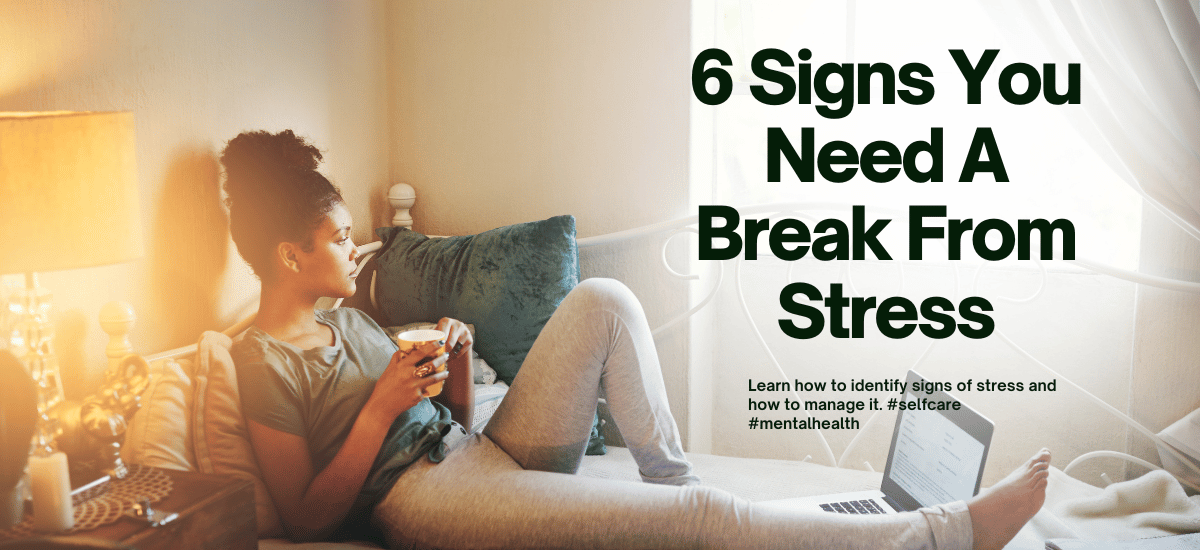6 Signs You’re Stressed Out And Need A Break!

We all know how important it is to listen to your body. It gives many signals to show it’s it’s time to destress or take a break from daily chores. Sometimes, we tend to ignore what our body needs and feel exhausted later on.
Let’s take a look at some of these signs to understand our stress related needs better and in detail.
1. Changes In Appetite
You may start eating regularly whether it is overeating or undereating. Several studies determine that most females (approximately 80%) binge eat during stress and settled for unhealthy eating choices. People who eat more during stress, choose foods that are significantly sweeter or greasier than the usual choices. As much as it’s comforting in the beginning, this could eventually turn out to be one of the most dangerous coping mechanism for your mental and physical health.
2. Digestive Issues
Have you ever had a time where you had digestive issues out of the blue? Your digestive system may also work against you, regardless of what you eat. Stress can really mess with your digestive system and cause stomach pain, bloating, diarrhea and constipation, even if you have been eating healthy. Maybe it’s not your food’s fault that your stomach doesn’t feel alright. It could probably just mean you’re stressed and need to take care of yourself.
3. Negative Emotions
Have you ever felt disappointed with yourself or demotivated to do a specific task?
You may feel all sorts of tension, restlessness, anxiety and even sometimes depression. Stress has a major impact on muscle tension and mood. It can all result in you feeling irritated, sad or vulnerable. Researchers suggests there are significant associations between acute and chronic stress with depression. Although stress doesn’t necessarily cause depression, it can be a possible factor that contributes to it as stress dysregulates bodily functions and moods.
4. Low Energy And Sleep Issues
Are you having a hard time trying to get some sleep?
Studies suggests that those experiencing more stressful events have a much higher risk of being diagnosed with insomnia. Having poor sleep continuously may make you feel exhausted during the day. The change in eating habits mentioned earlier may also cause an impact with your sleep cycle and contribute to low blood sugar levels, leading to low energy .
5. Abnormal Breathing Patterns/ Breathing Difficulty
Stress and strong emotions that we experience can cause our airways to constrict, as a response to the “fight or flight” hormone, resulting in symptoms such as rapid breathing. In some cases, such responses can cause an asthma or a panic attack.
6. Substance Misuse
Like food, substances like alcohol, cigarettes and drugs offers temporary satisfaction in the brain so you feel better. However, too much intake of anything can lead to consequences – such as excessive intake of alcohol or nicotine. If you’ve been craving substances more than normal, it may be a sign that you’re stressed and don’t have a let out.
We can see all these physical symptoms have an impact or are influenced by each other. They impact your mood and behavior. If you’re experiencing several of these mentioned symptoms, it’s time to take a step back and analyse what your body is telling you.
Maybe you should take a break? Take care of yourself and get all the rest you need. After all you got one body and one life.
Related Articles

Letting Go With Grace: Emotional Tools for Closure
Letting go is never easy. Whether we are parting ways with a loved one, ending a relationship, leaving a job, or saying goodbye to a cherished chapter of life, the emotional weight can feel overwhelming. Yet, closure is essential for our emotional well-being. Without it, we carry unresolved grief, anger, regret, or longing that can seep into new relationships and experiences, holding us back from healing and growth.

Breakup Blues: How to Cope and Rebuild Your Self-Worth
A breakup often feels like a silent earthquake—unseen by others but devastating within. The pain doesn’t just come from the loss of a relationship, but from the crumbling of the life, identity, and future you built with another person. You may find yourself questioning your worth, doubting your value, and feeling isolated even when surrounded by people. In Indian society, where emotional expression is often discouraged and breakups can be stigmatized, this pain may feel even more overwhelming. But the truth is—while breakups may shake you, they do not define you. You are not broken; you are in a process of emotional reformation. And with the right tools, guidance, and support system, you can rebuild not just your self-worth but also your entire life narrative.

Healing After Heartbreak: A Mental Health Perspective
Heartbreak doesn't just break your heart—it can shatter your sense of identity, peace, and purpose. Whether the end was expected or abrupt, mutual or one-sided, short-lived or long-term, the aftermath often leaves people emotionally disoriented. In Indian culture, where societal expectations and family involvement in romantic relationships are prevalent, the pain is not just personal—it is public. Yet, very few are taught how to heal from emotional loss in a healthy, sustainable way.

Boundaries in Love: Saying ‘No’ Without Guilt
Love, in its truest form, should be a safe space—a space where individuality is not only respected but celebrated. Yet, in many relationships, especially in the Indian cultural context, love is often misunderstood as constant availability, complete sacrifice, and putting the other person first, always. As noble as this may sound, this version of love often leads to emotional exhaustion, suppressed resentment, and the erosion of one’s identity.

Gaslighting in Relationships: What It Is and How to Heal
Gaslighting is a form of emotional abuse that erodes your ability to trust your own perception. It’s a slow, insidious process that often begins with subtle doubts and ends with complete self-questioning. In romantic relationships—especially in the Indian context where silence, compromise, and duty are often mistaken for love—gaslighting can be even harder to recognize.

How Depression Can Affect Your Relationship—And What You Can Do
Depression is not just an internal struggle—it ripples outward, affecting relationships, routines, and the emotional fabric that holds people together. When someone is dealing with depression, it's not only their world that becomes dim—it can cast a shadow over their most intimate connections too. In a country like India, where open conversations about mental health are still rare and love is often equated with endurance, depression within a relationship can become invisible, misunderstood, or misjudged.
